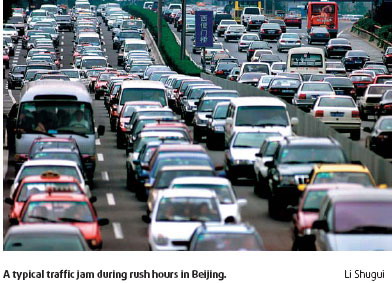OLYMPICS/ Columnists
Car ban not best cure for traffic woes
By Gu Wen (China Daily)
Updated: 2007-08-31 10:28
Beijing Olympic organizers have received rave reviews over their recent four-day test to see whether keeping 1.3 million cars garaged would be effective in improving air quality and easing traffic congestion in the run-up to the Games next year.

Although the much-anticipated blue sky had proved a bit elusive, 89 percent of locals agreed that alternately banning vehicles with license plates ending in odd or even numbers from roads on different days had "remarkably" helped improve the traffic conditions.
A just-released survey also shows even more (92 percent) thought that enhanced traffic control measures would be needed to ease congestion before the Games.
One might have some doubts about the survey's sampling methodology - it interviewed more than 1,000 residents aged between 15-70 but without telling how many of them own a car - but I still believed the results reflected a strong public frustration with the traffic gridlocks as well as a yearning for smooth-flowing roads.
In the current public debate about the city's traffic management, some people suggest that the practice of banning vehicles according to the last digit of their license plates should be legalized and enforced more often, instead of just being an Olympic emergency response to air pollution and traffic congestion.
Others hold that such measures, popular with residents notwithstanding, can only be temporary and should be used only as the last resort, because they were implemented with sacrifices from car owners who have paid taxes for their rights to use the roads and their vehicles.
The average car owner in the city may spend tens of thousands of yuan a year on taxes, insurance, parking fees, depreciation in car value and other expenses. As such, some argue that pulling cars from the roads now and then might look like a "simplistic" approach to a complex issue and represent "poor" urban management skills.
But if a ban is not the best way, how should the city deal with the pressures on its road network from its ever expanding vehicle population that stands at more than 3 million now, despite the fact that more new roads are being built every day?
Although it may sound like a nutty decision in terms of costs and traffic jams, more local people are choosing to drive because they live far from the office and enjoy the freedom that a car provides. A car is also a status symbol in our increasingly materialistic society.
Personally, I believe it may be time for the city to consider adopting congestion pricing that makes motorists pay to use the busiest roads, following London and Singapore.
The economics of road pricing is that when the road is free, people will continue to use it until traffic during peak hours slows to a crawl, according to Singapore's transportation minister, when he explained last week why the city state needs to set up more electronic road pricing gantries to ease traffic congestion.
Since it was introduced in London, vehicle speeds in the city's busy streets have increased and carbon-dioxide emissions from automobiles have dropped, both significantly.
In Beijing, besides charging for road usage, measures that will make driving costly, such as a heavier gas tax, may also be taken to motivate local motorists to drive less.
It's now certain there will be more traffic control measures in the works in the Olympic city. The only question seems to be: How far and how soon will they go?
For the Olympic Games next summer, motorists may still have to expect their cars to be grounded for more days, even though they want to pay extra to go for a drive around town.
Email: yuanzhou@chinadaily.com.cn
|